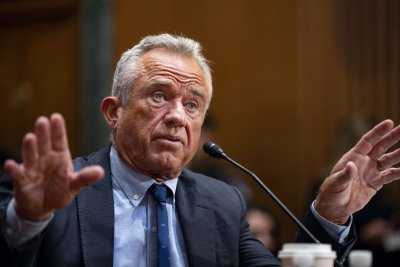HHS freezes Minnesota child care payments amid fraud accusations

Dec. 30 (UPI) — U.S. Department of Health and Human Services officials have frozen federal child care funding to Minnesota amid accusations of fraud in that state and others.
HHS officials announced the action on Tuesday and credited a viral video that suggests rampant fraud is occurring at Minnesota child care centers that provide daycare services for few, if any, children.
“You have probably read the serious allegations that the state of Minnesota has funneled millions of taxpayer dollars to fraudulent daycares across Minnesota over the past decade,” said Jim O’Neill, HHS deputy secretary, in a social media post on Tuesday.
In response to the “blatant fraud that appears to be rampant in Minnesota and across the country,” O’Neill said HHS officials have taken three actions.
One is to require justification and a receipt or photo evidence before sending federal Administration for Children and Family funds to a state.
HHS also launched a fraud-reporting hotline and email address, and identified individuals shown in a viral social media video at Minnesota daycare centers that appeared to have no children.
“I have demanded from [Minnesota] Gov. Tim Walz a comprehensive audit of these centers,” O’Neill said. “This includes attendance records, licenses, complaints, investigations and inspections.”
Conservative activist Nick Shirley recorded and posted the viral video, which, along with FBI evidence, spurred U.S. Department of Homeland Security Sec. Kristi Noem on Monday to launch what she called a “massive investigation on childcare and other rampant fraud,” according to CBS News.
Minnesota Department of Children, Youth and Families Commissioner Tikki Brown told CBS News the department questions “some of the methods used in the video” but takes the fraud concerns raised in Shirley’s video “very seriously.”
State officials visited some of the daycare centers featured in the video and said two of them were closed earlier this year, but officials at one said they intend to resume operations.
CBS News looked at the records for several of the daycares cited and said all but two have active licenses to operate in Minnesota.
State records show all of the active locations had been visited by state regulators over the past six months, with no evidence of fraud found, but citations were issued for staff training, safety, equipment, and cleanliness violations.
The alleged daycare fraud comes amid federal investigations of 14 Medicaid-funded programs in Minnesota, but none involved child care.
Among them is an investigation into the Feeding Our Future program that was intended to feed at-risk children during the COVID-19 pandemic but has triggered dozens of federal fraud convictions and has embroiled Rep. Ilhan Omar, D-Minn., who helped to promote it.
That alleged fraud cost an estimated $250 million and largely occurred within the Somali community in the greater Minneapolis-St. Paul area, which prompted President Donald Trump to halt Temporary Protected Status for Somalians in Minnesota.
